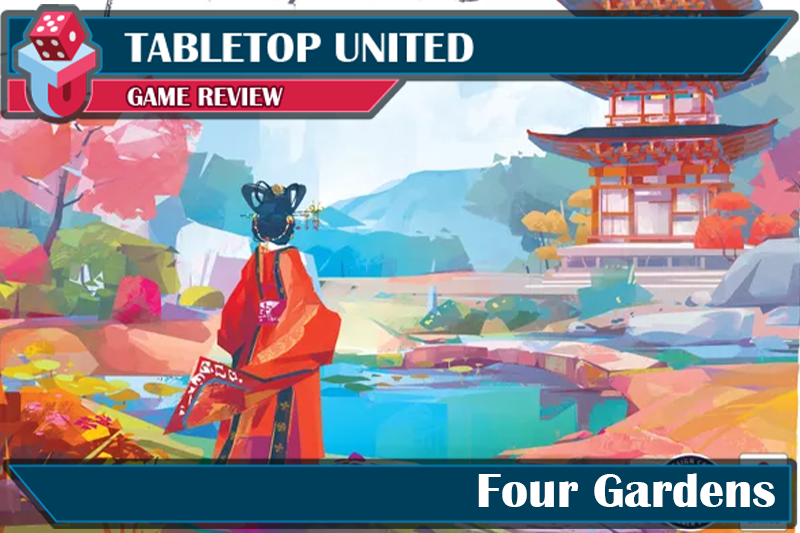
Four Gardens
Designer: Martin Doležal
Artist: Rachance
Publisher: Korea Boardgames
Year Published / Kickstarted: 2020
No. of Players: 2-4
Ages: 10+
Playing Time: 45 min
Main mechanic / Theme: Hand Management, Set Collection / Asian Garden
Whose garden can please the gods the most?
Disclaimer: Publisher provided a copy or prototype of the game for this review.
Overview:
From the Publisher: Long ago, in a beautiful kingdom, a queen and her people pleased their gods by building a mystical pagoda. Four beautiful gardens surrounded their construction, each dedicated to a god of the four seasons. As time passed, the queen fell ill, and her people were summoned to compete for her crown. The four gods would decide the new heir with a challenge to build the most pristine garden around the pagoda.
Rotate the pagoda strategically to collect resources and build your beautiful panoramic gardens. Manage the pagoda, your cards and your upgrades to win - but be mindful of the four gods' ever-changing judgments.
My Take: Four Gardens is a beautiful, thematic, and fun game of set collection and hand management. The multi-use cards are the engine that drives the game as you decide whether to use the cards in your hand to build your garden, turn the tower and collect resources, or reallocate the resources in your holdings. The goal of the game in the end is to complete panoramas that are pleasing to the gods and move your markers up the four god tracks for end-game points and, along the way, you'll even get to reduce the points of your opponents on those tracks if you plan properly. It's an easy game to learn that should appeal to players at all levels of experience because anyone can pick up quickly on how to play but the decisions of managing your hand and resources still lead to a lot of crunchy decision-making throughout the game.
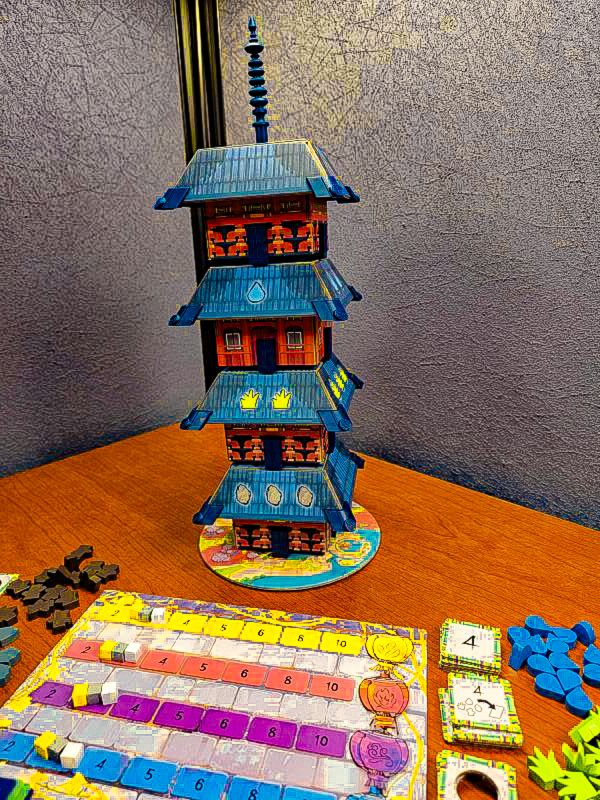
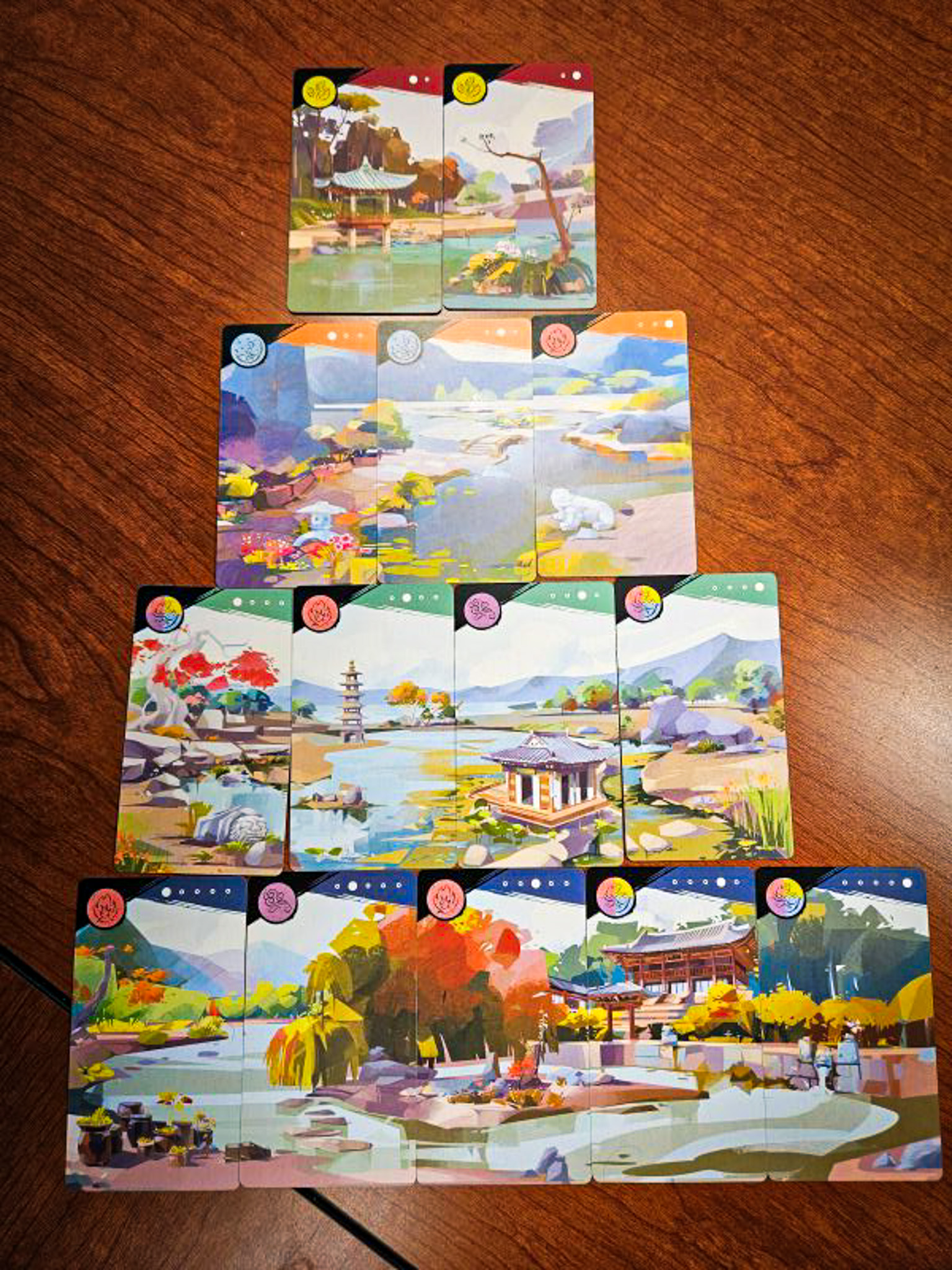
Gameplay and mechanics:
The gameplay is pretty simple. On your turn, you take exactly 3 actions, each of which requires you to play or discard one card from your hand of 5 cards. Those actions are to 1. Lay groundwork (play a card, groundwork side up into your tableau which will later be flipped to its landscape side to build your panoramas and move your markers on the god tracks), 2. Rotate & Collect (play a card to rotate the pagoda 90 degrees based on what is shown on the card and collect the resources from the top down or the bottom up, also denoted on the played card), 3. Take a wild (cards with wild symbols on them can be played to take a resource of your choice), or 4. Reallocate resources (discard any card to activate the Handcart symbol to move resources from your Planning tile to active Groundwork cards, from one active Groundwork card to another, or from your Planning tile back to the supply). The game ends when any player completes the set number of Landscape cards set by the number of players in the game. The current round is then completed so that all players have had the same number of turns and the final score is calculated by everyone's positions on the four god tracks plus any additional points earned via bonus tiles.
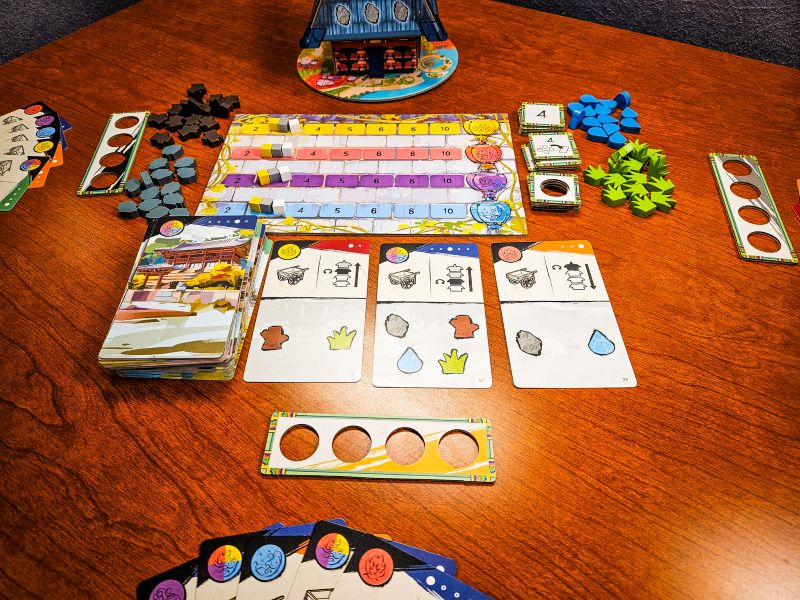
Theme, Artwork and Illustration, Graphic Design and Layout:
The artwork in this game is gorgeous and done in a way that no two tableus of any card count will look the same. At the end of the game, each player will have created their unique gardens and these will be different from those created in any other play of Four Gardens. The collecting of resources that you would use in building a garden (wood, water, stone, and plants) feels thematic and the wooden resource pieces are shaped to be what they represent which makes them nicer than just different colored cubes. The panoramas are beautifully painted and the resource pagoda is well done, easily assembled, and easy to use making it both an aesthetic and functional component in the game.
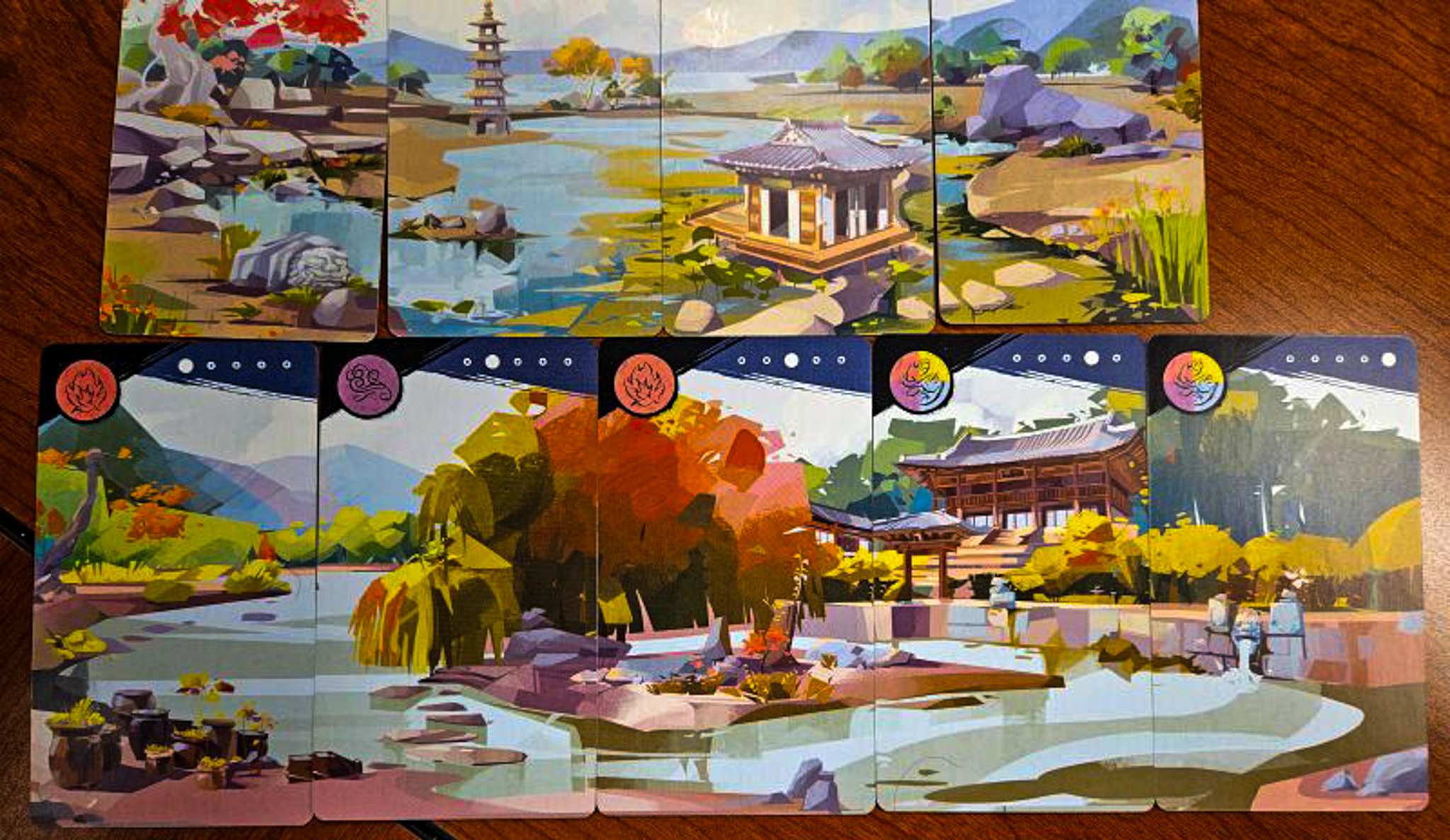
Inclusivity and Accessibility:
Tabletop United believes that diversity is a source of fun and happiness. Nurturing and celebrating our personal differences can lead to amazing gaming (and life) experiences. Therefore, TTU is putting renewed emphasis on inclusivity and accessibility by adding a section in each of our reviews written after April 2021. You’ll begin to see more reviews with this section as time goes on. The inclusivity and accessibility section will critique those issues and strengths of the subject in the review based upon the unique background of the reviewer. Each reviewer views the world through their own particular lens and has a wide and varied experience from which they will write and review from.
As there are no characters in this game and the game is culturally representative of Asian culture, I don't feel any vibes of excluding anyone. The garden-building theme is serene and calming and everything in the game uses symbols and colors to denote what does what in the game so playing is language and reading level independent. There are editions of the game available in English, Czech, French, German, Hungarian, Italian, Spanish, and Korean (most of which have rulebooks uploaded to Board Game Geek and an unoffical user uploaded rulebook in Chinese) so many languages are available as well. As long as someone in the group can read the rules and explain the game to the other players, language shouldn't be a barrier. The colors on the cards and god symbols are important to the game and I'm not sure how discernable they are from one another but the god symbols also have a distinct icon design and the colors associated with the size of the tableau have that size denoted by several pips so this game should also present no real problems for those with color blindness issues. The god favor marker cubes might present some trouble if the colors are too close and become muddled but with grey, black, white and yellow, I'm not sure this will be an issue either.
What worked:
The theme and gameplay all work well in my mind but what stands out the most to me is the multi-use cards. These cards are played groundwork side up in your garden and later flipped to be completed landscape cards when you finish a panorama and gain favor from the god icons on each completed landscape card in that panorama. They are also discarded to rotate the pagoda and collect resources. If the card has a wild symbol on it, it can be discarded to collect a wild resource. Finally, you can discard any card to use the handcart symbol and reallocate all of your resources. I will always be a fan of multi-use cards in games. They make the decisions in-game that much more crunchy as you have to choose how best to use a card to benefit your overall outcome.
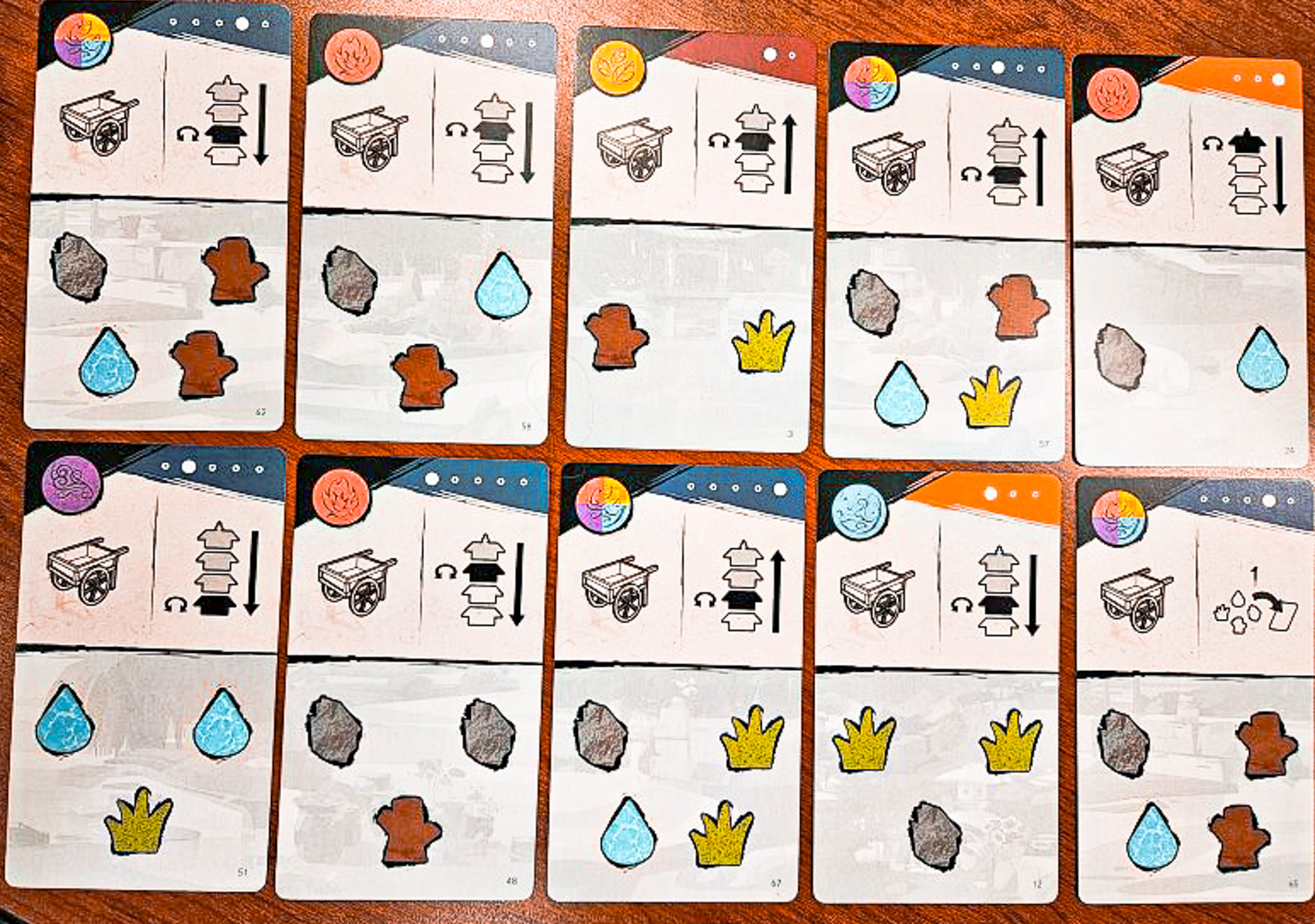
Final thoughts:
Four Gardens is a fun, competitive game that's mostly about peacefully building your garden panoramas. There is some take that here and there as whenever someone reaches the rightmost space on a God's track gets to move all other player's markers back on that track and there can be some strategy in the rotation of the tower that could hurt your opponent's resource collection. Overall, though, this is a pretty peaceful and calming gaming experience for all levels of gamers that is easy to teach, learn and play but has a lot of crunchy decision-making in the management of your cards and resources. At 45 minutes, it's a pretty good filler for game night or could be a good warmup or final game for the evening.
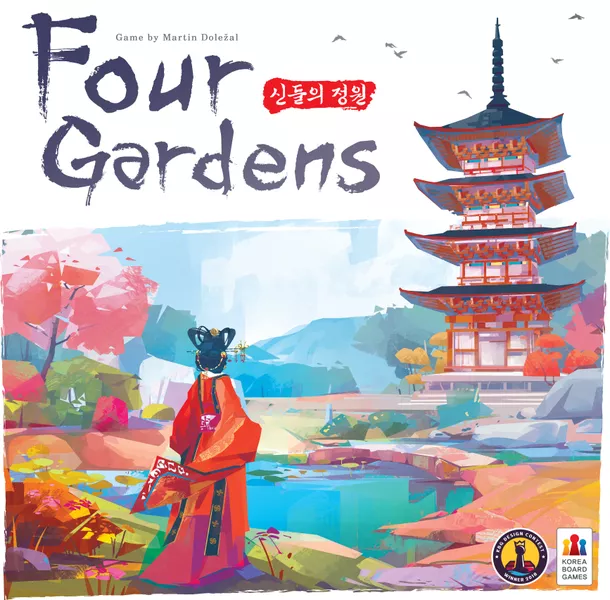

Find more info on BoardGameGeek.com
If you liked this review, please consider joining us on our social pages or subscribing to our newsletter:
FB Community: https://www.facebook.com/groups/ttucommunity/
Twitter: https://twitter.com/TabletopUnited
Instagram: https://www.instagram.com/tabletop_united/
Newsletter: https://www.subscribepage.com/tabletopunited
Stefan Yates

Stefan Yates is a professional in the Office of International Programs at Kansas State University. Finding ways to work gaming into work, he serves on the university’s Alternate Reality Game Committee and is a co-faculty advisor for the Board Game Club. He is also a PhD student whose field of research is Gamification in Student Programming. He enjoys playing (and mostly losing) almost any type of game and likes to work in multiple game sessions per week whenever possible. An avid solo gamer with an additional interest in tabletop miniatures games, the stay-at-home orders of the pandemic were not particularly concerning as there was always painting to do and terrain to build. Stefan is also a book and movie collector and a huge football fan (go CHIEFS!)